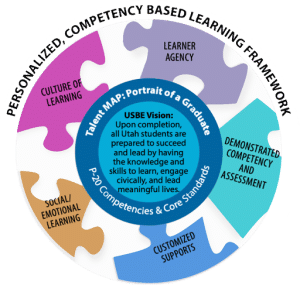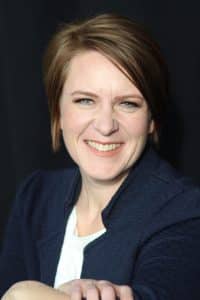Utah’s Launchpad to Personalized, Competency-Based Learning
CompetencyWorks Blog
This post is one of a two-part series about school transformation in Utah along with Navigating Personalized, Competency-Based Learning in Utah: The Cruise Ship & The Speedboat.
Educators today know that what we’ve been doing for the past one hundred years is not preparing students for a rapidly changing future, but at the same time we don’t necessarily have one solution. It is imperative that our learning communities have not only the encouragement to innovate, but also permission and reassurance from state and federal agencies that they will be supported in those innovations, even if they fail.
In Utah, legislation opened the door. What followed helped to pave the way for the grants program, with technical and financial assistance, for those willing and ready to center their systems and structures on learners and learning.
In 2016, a Utah bill (S.B. 143) made it easier for districts to innovate and personalize learning with the goal of improving educational outcomes in public schools by advancing student mastery of concepts and skills. S.B. 143 called for the establishment of a review committee to support the Competency-Based Education Grants Program, which paired with the subsequent Utah State Board of Education (USBE) Rule R277-712 detailing the makeup and responsibilities of the review committee, including:
- Establishing metrics to analyze the quality of a grant application
- Reviewing planning grant applications
- Determining which applications should be recommended to and selected/approved by the Superintendent and the Board
In response to an identified barrier that competency-based education (CBE) could affect per pupil funding, participating Local Education Agencies (LEAs) were additionally supported by another bill, S.B. 34, which created a funding mechanism for reimbursement related to competency-based learning. The mechanism allows LEAs to seek financial reimbursement for high school students who graduate early. The intent was to reduce a potential hurdle for LEAs by removing the financial loss associated with early graduation for students.
Shared Exploration to Build a Foundation
In September of 2017, a group of educational leaders from 14 LEAs and staff from the USBE met for a two-day training exploring CBE, with the goal of:
- Understanding what CBE could look like for Utah K-12 communities
- Building a framework for CBE in Utah
- Establishing shared vocabulary
- Providing “guard rails” for implementation
- Planning how to build community knowledge, early foundations, and initial experiences, such as:
- Visiting existing CBE implementation sites
- Sharing expertise to shape a shared vision
- Being the voice for CBE for the state of Utah
Phase I: Planning
Through the Competency-Based Education Grants Program, in 2019, six Local Education Agencies (LEAs)—the American Academy of Innovation Charter School, Davis School District, Duchesne County School District, Iron County School District, Juab School District, and the Murray City School District—began planning for their implementation journey in a total of 45 schools. With a full year of technical and financial assistance to support planning, these LEAs partnered with USBE, Mastery Transcript Consortium and TNTP as they worked to envision what early implementation might look like in their local learning communities and explored potential ways to measure their progress.

Phase II: Early Implementation
With supportive legislation, a shared vision for what’s possible, common language and a framework, the foundational building blocks from the exploratory and planning phases prepared the way for those ready to move beyond visioning and planning toward implementation.
Goals for the implementation pilot phase were:
- Application based on the Competency-Based Education framework from the Exploratory Pilot
- Establish outcomes and measures of success
- Begin to evaluate models of implementation to inform scaling
- Anticipated outcome: Identifying promising practices from innovative learning environments to scale school or districtwide
Continued Adaptation and Innovation
 Utah continued to innovate and respond to shifts in the national education landscape, getting clear on what flexibility means for Utah educators as well as revisiting language. In 2021, S.B. 143 would be amended by House Bill 181, redefining competency-based learning as personalized, competency-based learning (PCBL), and replacing the original framework with Utah’s PCBL Framework. The grants program would also take on a rebranding while continuing to support cohorts of LEAs eager to explore learner-centered, competency-based systems of teaching and learning.
Utah continued to innovate and respond to shifts in the national education landscape, getting clear on what flexibility means for Utah educators as well as revisiting language. In 2021, S.B. 143 would be amended by House Bill 181, redefining competency-based learning as personalized, competency-based learning (PCBL), and replacing the original framework with Utah’s PCBL Framework. The grants program would also take on a rebranding while continuing to support cohorts of LEAs eager to explore learner-centered, competency-based systems of teaching and learning.
Each year the enthusiasm for PCBL grows in Utah. What began as 45 schools now totals more than 300 schools exploring the possibilities and benefits of PCBL in support of each learner developing the knowledge and skills needed to thrive now and in a rapidly changing future.
The six LEAs that began their journey as Cohort A are now expanding their implementation and leading those following in their footsteps. From sharing successes to confessing false starts, they are providing valuable experience and knowledge to inform the efforts of each wave of innovative educational leaders. For more information about the work of two of these LEAs, refer to the companion blog post, Navigating Personalized, Competency-Based Learning in Utah: The Cruise Ship & The Speedboat. Learn more about current grant recipients here.
 Michael Hakkarinen is an experienced classroom teacher, instructional technology specialist, and professional learning facilitator. As the PCBL Specialist for the Utah State Board of Education, he provides support to Utah LEAs focusing on personalized and competency-based educational strategies. Michael has a Master’s degree in education from Mount Saint Mary’s University, and has been an ISTE Certified Educator since 2019. When not talking about educational technology and learner-centered philosophies, you can find Michael lost somewhere in the mountains of Utah on either skis or a bicycle depending on the season.
Michael Hakkarinen is an experienced classroom teacher, instructional technology specialist, and professional learning facilitator. As the PCBL Specialist for the Utah State Board of Education, he provides support to Utah LEAs focusing on personalized and competency-based educational strategies. Michael has a Master’s degree in education from Mount Saint Mary’s University, and has been an ISTE Certified Educator since 2019. When not talking about educational technology and learner-centered philosophies, you can find Michael lost somewhere in the mountains of Utah on either skis or a bicycle depending on the season.
 Syd Young is the Director of Teaching and Learning at KnowledgeWorks. Syd believes that every child deserves to have relevant experiences that prepare them for lifelong learning and navigating a rapidly changing future. She is keenly motivated to help educators and administrators envision ways to translate aspirations more effectively into reality as she partners with learning communities across the country. Her fervor for strategizing ideal local conditions, where individuals see themselves as change agents, dates back to her days in conservation biology and previous roles as a science teacher, school administrator, and education specialist at the Utah State Board of Education.
Syd Young is the Director of Teaching and Learning at KnowledgeWorks. Syd believes that every child deserves to have relevant experiences that prepare them for lifelong learning and navigating a rapidly changing future. She is keenly motivated to help educators and administrators envision ways to translate aspirations more effectively into reality as she partners with learning communities across the country. Her fervor for strategizing ideal local conditions, where individuals see themselves as change agents, dates back to her days in conservation biology and previous roles as a science teacher, school administrator, and education specialist at the Utah State Board of Education.